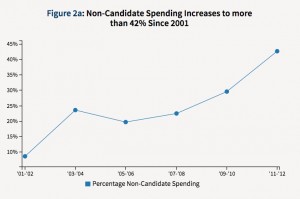In 2010, the Supreme Court ruled in Citizens United v. Federal Election Commission that corporations and outside interest groups have the constitutional right to spend unlimited amounts of money on campaign advertisements — and these groups aren’t holding back.
The American Constitution Society for Law & Policy recently published a study claiming that television attack ads are influencing state justices’ rulings against defendants in criminal appeal cases.
The study, “Skewed Justice,” analyzed 3,000 state supreme court criminal appeals from 2008 to 2013. Co-authors Joanna Shepherd and Michael S. Kang, professors at Emory Law School, said roughly $3 million were spent on 2002’s judicial elections compared to $24 million in 2012.
Figure 2a screenshot
Prior to the Citizens United ruling, 23 states held bans on unlimited spending. Since then the affected states have experienced a 7 percent decrease in judges voting in favor of the accused.
This type of spending can be bribe money.
“Donors want clarity, certainty even, that the judicial candidates they support view the world as they do and will rule accordingly,” Sue Bell Cobb, former chief justice of the Alabama Supreme Court from 2007 to 2011, wrote in a recent essay for Politico Magazine.
What does the public think?
A poll commissioned by Justice at Stake and the Brennan Center for Justice finds that 87 percent of voters believe campaign donations on judicial elections influence a judge’s decision on the bench. Ninety-two percent of voters also said that if any party in a court case has donated directly to a judge’s campaign, the judge should step aside.
Cobb wrote that she’s never made a decision in a case where she sided with a party because of a campaign donation, but anyone seeking judicial office will find themselves doing things that feel “awfully unsavory.”
In January 2015, former Arkansas Circuit Judge Mike Maggio plead guilty to federal bribery charges after a health care business owner funneled thousands to Maggio’s campaign before slashing a jury’s verdict of $5.2 million to $1 million in fines against the business.
Shepherd and Kang wrote that what is most troubling of all is that: “The findings reveal that the influence of money has spread from civil cases to criminal cases, in which the fundamental rights of all Americans can be at risk.
“Everyone, not just criminal defendants, has a stake in how these cases are decided, because a state supreme court’s decision to limit or narrowly interpret a defendant’s rights under a state constitution similarly restricts those rights for everyone in that state.”
During her 30 year tenure as a justice, Cobb fought hard to eliminate this type of spending.
“I worked for years with former state Representative Jeffrey McLaughlin to eliminate partisan races for judicial office that often make these campaigns overtly and inappropriately political and tend to drive up the amount of money spent by outside groups.”
She explained that whether the legislature was controlled by Democrats or Republicans—they couldn’t make headway.
“McLaughlin even recounts how one Republican legislator threatened lawmakers of his own party that if they voted to eliminate partisan judicial races, he would ensure they would face primary opponents in their next campaigns.”
How effective are attack ads?
According to “Skewed Justice,” 44 percent of the ads sponsored by outside interest groups are attack ads, while only 2 percent of candidate-approved ads and 11 percent of party-sponsored ads cast opposing candidates in a negative tone.
Figure 4 screenshot
In 2002, State Republicans ran advertisements portraying William O’Neill as a rape sympathizer during his campaign for Ohio Supreme Court justice. His opposition, Robert Cupp, was depicted as protecting victims of violent crime, ThinkProgress writes.
“The ad punished O’Neill for doing his job to enforce constitutional protections in a 2000 case in which he found a rape defendant’s lawyer failed to call a witness that could have exonerated him. O’Neill was elected anyway. But the ad could affect his decision-making on the high court…”
While justices may not always lose their re-elections after attack ads run, Shepherd and Kang write the wealthiest Americans will only perfect and professionalize their new electioneering methods in time.
“The findings reveal that the influence of money has spread from civil cases to criminal cases, in which the fundamental rights of all Americans can be at stake.”
Justin Carissimo is a writer for Legal Funding Central https://









